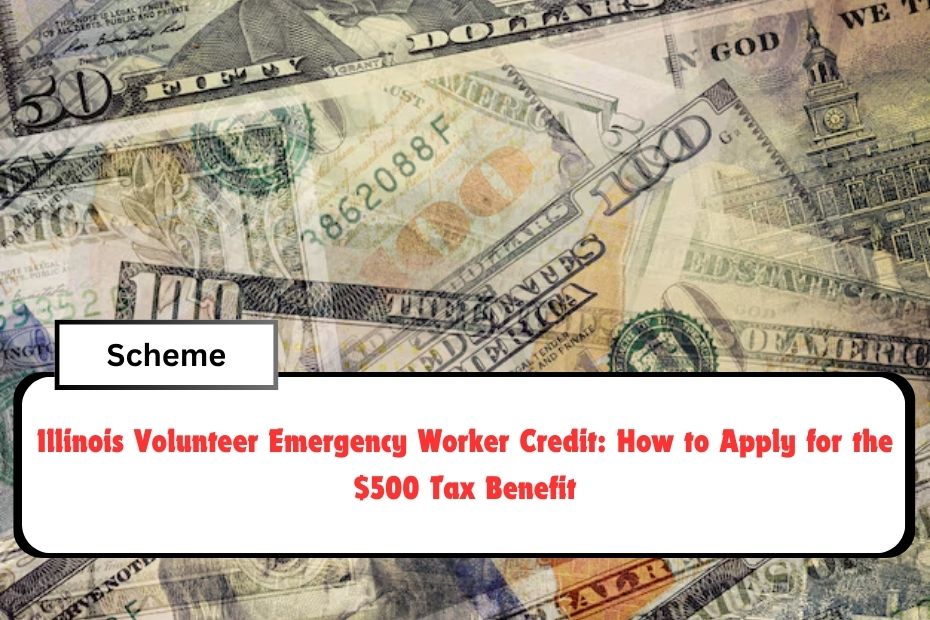Emergency Worker Credit: If you’re a volunteer emergency worker in Illinois, there’s great news for you! A new economic stimulus check of up to $500 is available, thanks to the Volunteer Emergency Worker Credit (VEW). This program is designed to recognize the hard work of those who serve their communities. Let’s dive into all the details, including how you can qualify and apply for this credit.
What is the Volunteer Emergency Worker Credit (VEW)?
The Volunteer Emergency Worker Credit is a special program in Illinois under Public Act 103-0009. It offers a $500 tax credit for volunteer firefighters and other emergency workers. The goal is to help reduce the amount of state income tax these workers need to pay.
Here are some key details:
- Taxable Years: The credit applies to income earned from January 1, 2023, through December 31, 2027.
- Annual Limit: Only $5 million in credits are available each year, given out on a first-come, first-served basis.
- Non-Refundable: If your tax bill is less than $500, the leftover credit can’t be refunded or carried forward.
Who is Eligible for the VEW Credit?
To qualify for the VEW credit, you must meet these conditions:
- Volunteer Service Duration: You need to have worked at least 9 months in 2023 as a volunteer emergency worker.
- Compensation Limit: Your total earnings for volunteer emergency work must be $5,000 or less in 2023.
- Application Submission: You must complete and submit a credit application to the Illinois Department of Revenue (IDOR).
- First 10,000 Applicants: Only the first 10,000 eligible applicants will receive the credit.
If you don’t meet these criteria or submit your application late, you won’t qualify.
How to Apply for the VEW Credit
The application process is straightforward. Here’s what to expect:
- Submit Your Application: Complete and send your credit application to IDOR as soon as possible.
- Confirmation Email: Once submitted, you’ll get an email confirming that your application has been received.
- Approval Process:
- If you are among the first 10,000 eligible applicants and your information matches OSFM (Office of the State Fire Marshal) records, you’ll get a certificate of creditworthiness.
- If your details don’t match, your application will be denied.
- Additional Info Requests: If IDOR needs more details, they’ll contact you by email. You’ll have 10 business days to respond.
Important Considerations
Before applying, keep these points in mind:
- Non-Refundable Credit: This credit reduces your tax bill but won’t give you a refund. For example, if your tax is $200, you can use $200 of the VEW credit to bring your liability to zero. The extra $300 won’t be refunded or saved for future use.
- Application Cap: Only the first 10,000 qualified applications are approved each year. Late submissions won’t be accepted.
- No Tax Liability: If you don’t owe Illinois income taxes, this credit won’t benefit you.
Why the VEW Credit Matters
This program is a great way to recognize the hard work and dedication of volunteer emergency workers. While it doesn’t provide cash refunds, it can significantly lower tax bills for those who qualify. However, acting quickly is key since the credit is limited to a set number of applicants.
Conclusion
The Volunteer Emergency Worker Credit (VEW) is an excellent opportunity for eligible emergency workers in Illinois. By meeting the requirements and applying early, you can benefit from this $500 tax credit and reduce your tax burden. Make sure you understand the rules, apply on time, and keep an eye out for emails about your application status.
Guilderland Historical Society
FAQ’s
1. What happens if my application is denied?
If your application is denied because of a mismatch with OSFM records, you won’t receive the credit. You can contact IDOR to clarify any discrepancies.
2. Can I apply for the VEW credit if I earned more than $5,000 in 2023?
No, you won’t qualify for the VEW credit if your compensation for volunteer emergency work exceeds $5,000.
3. How will I know if I qualify for the VEW credit?
You’ll receive a confirmation email if your application is approved. If not, IDOR may request more information or deny your application if you don’t meet the criteria.

